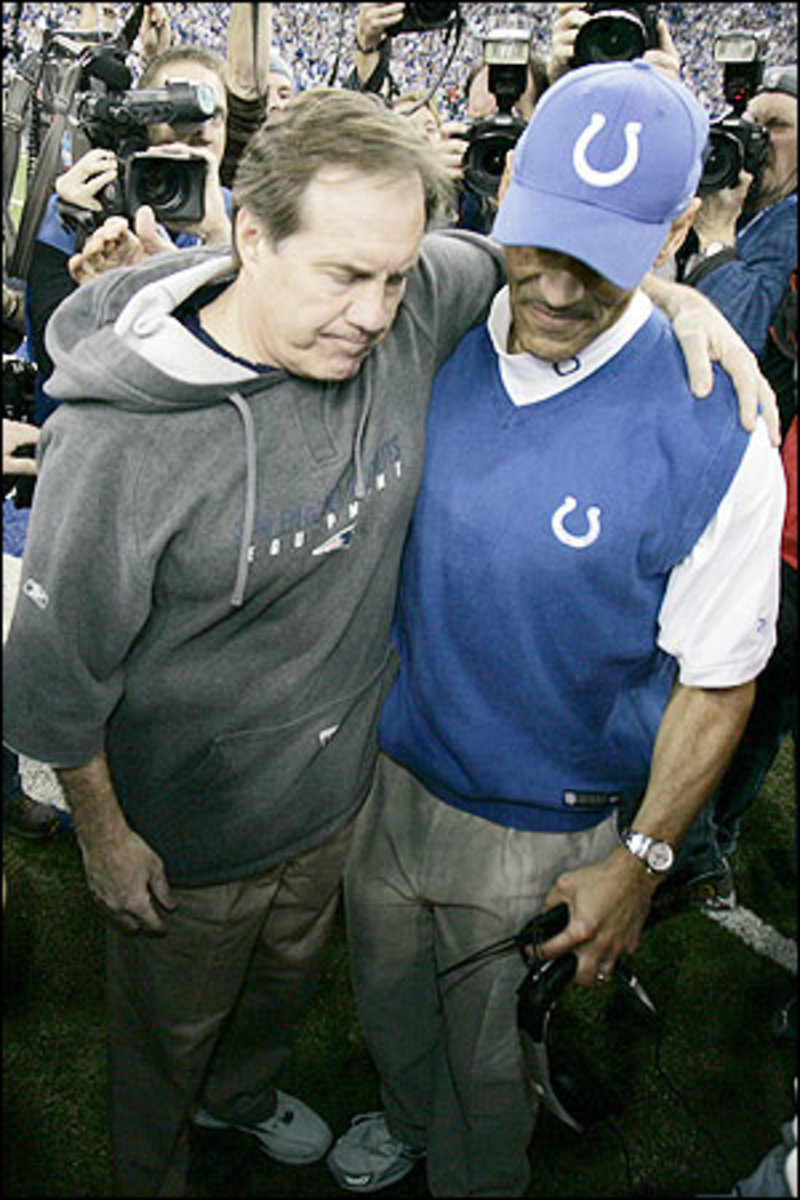
Different paths to success
They are the top two coaches in the profession, Super Bowl champions, innovators, and frontmen for their organizations. They have teams built around legendary quarterbacks, smart and agile defenses and pinball-scoring offenses. They have turned former NFL outposts into hotbeds with standing-room-only stadiums.
But as Bill Belichick and Tony Dungy prepare for Sunday's game between the New England Patriots (8-0) and Indianapolis Colts (7-0), could any two coaches be viewed more differently?
Beyond the plot points of homefield advantage and a possible perfect season, Sunday's tussle at the RCA Dome offers an even more visceral storyline: two coaches as polar opposites, one seen as light, the other as shadow. If Dungy has become the NFL's most beloved coach, Belichick easily could be its most reviled.
Dungy is seen as the quiet and classy presence, the author of a best-selling book on faith. Belichick is viewed as an enigma wrapped in a hoodie, a coach unearthing battle strategies from the pages of the Art of War. The truth, of course, is probably more complicated than that, but these are the roles the men have taken deep into their coaching careers.
Whether it is envy at his accomplishments (three Super Bowl titles in four years), shock at his cloak and dagger thievery (Spygate) or anger at his fourth-quarter methods (running up the score), Belichick has poked and prodded his players into an explosive and unforgiving unit. He is the coach who is never satisfied, always nitpicking, even after the blowout wins.
One of his favorite things to say is that Tom Brady has been a pretty good quarterback for the Patriots. No hyperbole. No gushing. Just pretty good.
Belichick talked up Romeo Crennel when he went to Cleveland, locked out Eric Mangini when he went to the Jets, and famously scribbled his own resignation from the Jets on a cocktail napkin.
In talks with the media he can be surprisingly detailed if certain questions move him, but more often he deflects with an array of his favorite monosyllables.
Dungy seems to live with the volume turned down, his expression unchanged, his faith unmoved regardless of the down and distance. Before Dungy led the Colts to last season's Super Bowl title, the whispers (and his former kicker Mike Vanderjagt) said that he was too nice to inspire a team to a championship, too calm to lead in a sport built on machismo.
Dungy is more Joe Torre than Bob Knight, more poker face than pounding fists. He has taken nine of his previous 11 teams to the playoffs, starting with Tampa Bay. Instead of dealing with a post-Super Bowl hangover, the Colts are one of the two best teams in football.
"Everybody has a different perception of what iron-fisted means," Dungy said during a conference call this week when asked about his demeanor. "I think you want to be disciplined and you want to have a team that doesn't beat themselves and doesn't have penalties and mistakes, that's disciplined on and off the field. There are a lot of ways to get that."
Whichever method you subscribe to, Belichick, 55, and Dungy, 52, have proven to be peerless in the last decade. They are as much a part of the fabric of their teams as any player on the roster.
While viewers Sunday will be watching the aerial battle between Brady and Peyton Manning, and the artistry of Randy Moss and Marvin Harrison, the chess match between Dungy and Belichick will have already started.
Every speed rush by Dwight Freeney or run support tackle by Bob Sanders will have the fingerprint of Dungy. Every Mike Vrabel blitz or tipped pass by Rosevelt Colvin will have been greenlighted by Belichick.
"I've known Tony for a long time," Belichick said this week in a press conference. "I have a lot of respect for Tony. We're both defensive coaches and we're both kind of the same age. We've been around it for a long time."
On Sunday, they will each bill three more hours, two coaches seen in shades of darkness and light, each one reaching for the same goal.





